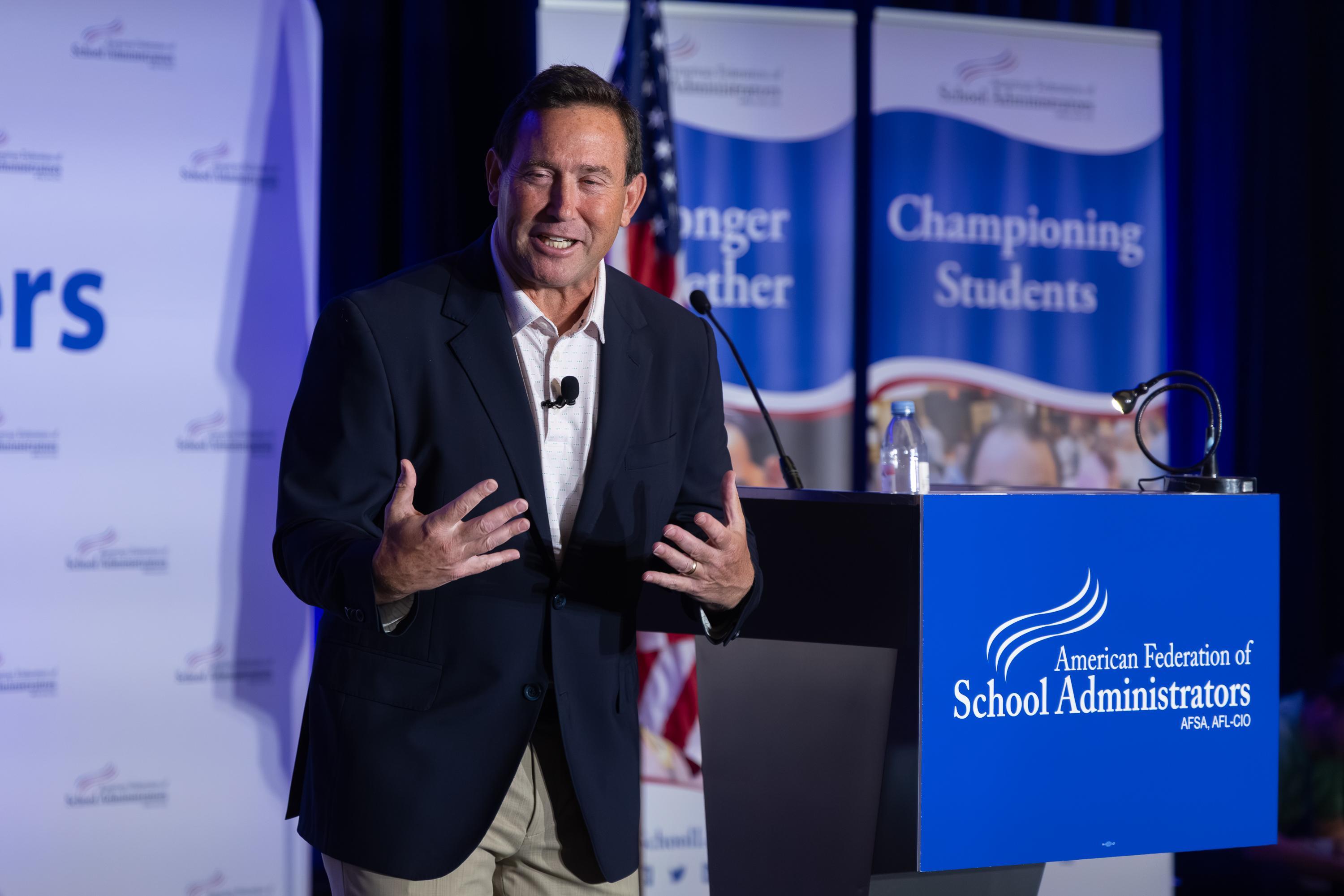Educators are the backbone of every community, but their ability to inspire students and transform schools depends on one essential ingredient: positive leadership. That was the message best-selling author and global leadership consultant Jon Gordon delivered during the opening keynote of the convention.
Gordon, an 18-time best-selling author of more than 30 books—including "The Energy Bus"—has coached CEOs, championship team, and Fortune 500 companies. Yet on stage, his focus was on the educators who shaped his life and the school leaders in the audience.
“I know the difference you make. I know the impact you have. I wouldn’t be here today if it wasn’t for the educators in my life,” Gordon told attendees.
Raised in a Jewish-Italian, working-class family on Long Island, New York, Gordon described himself as the product of public schools—and of the teachers and coaches who saw potential in him even when he did not. He recalled being a depressed eighth grader, cut from the baseball team and struggling with suicidal thoughts, when a coach encouraged him to take up track. Running gave him confidence and purpose. Another coach pushed him to stick with lacrosse, predicting he would one day play in college—an unlikely encouragement that led Gordon to Cornell University, where he excelled academically and athletically despite his modest beginnings.
“It was their belief, and the culture of leadership in those schools, that made the difference,” he said.
Gordon shared that positivity didn’t come naturally. The son of a tough New York City police officer, he grew up around negativity. Later, after losing his job during the dot-com crash at age 31, he spiraled into anxiety and fear—until his wife challenged him to change. That turning point sparked his study of positive psychology and ultimately shaped the practices he now shares with millions through books, talks and newsletters.
“The irony is, I am not naturally positive. I’ve had to work on it my entire life,” Gordon admitted. “But positive leadership is a competitive advantage. It’s not about ignoring reality—it’s about believing in a brighter one and working to create it.”
Gordon introduced his FUEL framework—an acronym for Feed, Uplift, Encourage and Lead with purpose. Targeted at educators, the model equips school leaders with tools to restore themselves, inspire staff and students, and foster thriving, positive school cultures. Optimism, he emphasized, is not “Pollyanna thinking” but a disciplined approach that helps leaders overcome real challenges.
“You don’t get burned out because of what you do—you get burned out because you forget why you do it. When you remember your why, you’ll find the way,” Gordon said.
He encouraged daily rituals to lift leaders’ state of mind: morning sunlight, journaling, gardening, playing music or walking a dog. These habits, he explained, restore energy far more effectively than temporary “relief” behaviors like excessive screen time or alcohol.
Encouragement, he said, is essential. “Talk to yourself instead of listening to yourself,” Gordon advised, citing triathlete James Gills, who completed six double Ironman races by silencing doubt with affirmations.
Love, Gordon emphasized, is both a noun and a verb: it drives grit, casts out fear and turns commitment into action. He illustrated this with personal stories: his wife’s renewed energy after discovering she had the genes of an Olympic athlete, and his mother’s final act of selfless love—making him a sandwich for a five-hour drive just days before she passed away. “When you’re selfish, your legacy ends with you. When you’re selfless, your legacy carries on to others,” he said.
He reminded the audience that in a world full of negativity, division and fatigue, educators must ground themselves in belief, connection and resilience to continue inspiring students.
“Fear divides. Negativity divides. But connection and purpose heal,” Gordon said. “When we uplift our state of mind every day, we become more powerful. That’s what allows us to lead, to serve and to truly change lives.”
Gordon also shared his coffee bean analogy: while carrots soften and eggs harden in boiling water, coffee beans transform their environment. Similarly, leaders who stay positive, purposeful and resilient can transform their schools even amid challenges.
For Gordon, the stakes could not be higher. “Put a great leader in every school, support that leader and pay educators what they deserve—that’s how we transform education,” he said, drawing applause. He reminded administrators that their names, their schools and their daily choices carry weight far beyond the present.
“You are more than enough. You are the heroes who rise up every day, not because it’s easy, but because you love others and want to make a difference. That’s how we change the world,” Gordon said.
He concluded with a clear message: “Even in the face of challenges, the greatest power a school leader has is the ability to show up every day with positivity, love and purpose. By nurturing themselves and those around them, leaders can transform their schools from the inside out and create lasting impact for students, staff and the entire community.”

